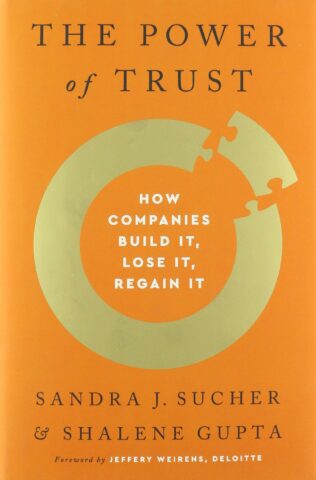Building long-term trust
You’ll find it difficult to ride out the disruptions caused by the ceaseless turbulences of our times if you don’t strengthen your organization’s trust capital. Sucher and Gupta suggest (re)building and developing an enduring “trust pact” with your teams and customers in four stages.

The Power of Trust : How Companies Build It, Lose It, Regain It,
by Sandra J. Sucher and Shalene Gupta, (Public Affairs, 2021).
Your organization’s trust capital is the foundation on which the loyalty of your teams and fidelity of your customers is based, and it guarantees the sustainability of your business. However, in times of economic and financial crisis (such as 1987, 2008 and 2020), the trust we have in companies drops. And this is especially the case today: The health crisis hasn’t just shaken up the supply and demand mechanisms; it has also called our business models and work organization into question.
Building trust in your organization takes place in four stages:
Capitalize on expertise: At a time when the health crisis has disrupted working methods and distribution channels, you have to innovate (you don’t have the choice!) in order to offer reliable solutions to meet new needs.
Boost buy-in: (Re)define your organization’s purpose so you can adapt it to post-pandemic social issues.
Ensure fairness: When times are tough, don’t forget to treat all your stakeholders – and especially your employees – fairly, no matter where they are based.
Demonstrate impact: Be sure todemonstrate the alignment between your organization’s purpose and its real impact by measuring the latter and correcting it, if necessary.
No. 1: Expertise: The foundation of all trust
Expertise – your teams’ ability, in other words, to design and supply products or services that your customers can’t do without – is the bedrock of your organization’s trust capital. It creates a fundamental but limited cognitive trust based on the rational assessment of objective qualities attached to a brand (relevance, reliability and efficiency) because of the excellence of its methods and/or its technical and human know-how.
1 “Affect-Based and Cognition-Based Trust as Foundations for Interpersonal Cooperation in Organizations” by Daniel J. McAllister (Academy of Management Journal 38, No. 1, February 1995).
2 “Spontaneous Giving and Calculated Greed” by David G. Rand, Joshua D. Greene and Martin A. Nowak (Nature 489, No. 7416, 2012).
3 “Normative Foundations of Human Cooperation” by Ernst Fehr and Ivoi Schurtenberger (Nature Human Behavior 2, No. 7, 2018).
4 “Intentional Harms are Worse, Even When They’re Not” by Daniel L. Ames and Susan T. Fisken (Psychological Science 24, No. 9, September 2013).
5 “Perceived Intent Motivates People to Magnify Harms” by Daniel L. Ames and Susan T. Fisken (PNAS 112, No. 12, March 2015).
6 “Les nouvelles attentes de Français envers les entreprises,” Elabe study for the Institut de l’Entreprise, September 2022: https://fr.calameo.com/read/0057695845d89a3f458c5
7 “Do Kids Have a Fundamental Sense of Fairness?” by Katherine McAuliffe, Peter R. Blake and Felix Warneken (Scientific American, August 2017).
8 “Indirect Effects of Employer Behavior on Workplace Performance” by Matthias Heinze, Sabria Jeworrek, Vanessa Mertins, Heiner Schumacher and Matthias Sutter (Vox, December 2017).
9 “Purpose: Shifting from Why to How” (McKinsey & Company, April 2020).
10 “The Abilene Paradox: The Management of Agreement” by Jerry B. Harvey (Organizational Dynamics 3, No. 1, Summer 1974).
11 “The Verge Tech Survey 2020” by Casey Newton (Verge, 2 March 2020).
12 “The NCB Capital Turnaround: Waking the Sleeping Giant” by Sandra J. Sucher, Shalene Gupta, Gamze Yucaoglu and Fares Khais, unpublished Harvard Business Publishing Case.
© Copyright Business Digest - All rights reserved




